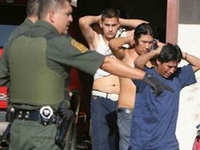-
Obama’s executive order will shield 5 million undocumented immigrants from deportation
In the face of bitter protests from Republicans in Congress, President Obama will soon announce that he will be using executive orders to launch a broad overhaul of the U.S. immigration enforcement system. One of the immediate results of the overhaul would be to shield up to five million undocumented immigrants – nearly half of the estimated 11.5 million undocumented immigrants currently in the United States — from the threat of deportation. The president’s orders will also provide many of these undocumented immigrants with work permits.
-
-
U.S. introduces new security measures to screen Western-passport travelers
At least 3,000 of the 15,000 foreign fighters in Syria are from Australia and Europe. DHS has introduced new screening measures for travelers from Europe, Australia, and other allied nations due to concerns about the increasing number of Islamist militants who have fought in Syria and Iraq alongside the Islamic State (ISIS) and could travel freely to the United States using their Western passports.
-
-
Court orders reinstatement of CBP terminated employee, saying termination was unjustified
Customs and Border Protection(CBP) agent Thomas G. Wrocklage has triumphedin his effort to return to work following a federal appeals court’s disagreement with how the Merit Systems Protection Board(MSPB) decided his removal appeal. Wrocklage disagreed with his supervisors about a $300 fine issued to an elderly couple returning from a trip to Canada for failure to disclose to a second border officer that they had with them some fruits and vegetables.
-
-
Vet alleges supervisors at CBP IA ignored his disability: “He Just needed an ounce of compassion” -- Pt. 1

J. Gregory Richardson, a Lieutenant Commander in the Navy (Retired) who injured his back on his last deployments, says that when he served a Senior Security Analyst t Customs and Border Protection Internal Affairs (CBP IA) from 2006 until 2013, supervisors there repeatedly ignored his status as a disabled veteran despite extensive documentation of his medical condition. A fellow CBP IA employee agrees: “he (Richardson) just needed an ounce of compassion” from his supervisors, she said. This veteran never received an ounce of compassion, however, or any other consideration or accommodation. He appears to have been set adrift in the complexities of the federal employment procedures and policies process.
-
-
Data indicate there is no immigration crisis
Is there an “immigration crisis” on the U.S.-Mexico border? Not according to an examination of historical immigration data, according to a new study. The paper examines historical immigration data, the “push” and “pull” factors currently motivating Mexicans and Central Americans to migrate to the United States and attempts to explain why current undocumented immigration across the U.S.-Mexico border has been perceived as a crisis.
-
-
Eligible Haitian immigrants to be allowed to wait in U.S. for green card processing
Haitian immigrants eligible for green cards will soon be able to wait through the process in the United States, according to a new family reunification program proposed by President Barack Obama. Starting next year, DHS will begin the implementation of the Haitian Family Reunification Parole (HFRP) program, aiming to accelerate the green card process for those living in Haiti who have already been approved for an immigration visa due to familial connections.
-
-
As U.K. elections approach, immigration debate simmers

As the 2015 British Parliamentary elections approach, increasing attention is focused on current immigration issues and attitudes in the kingdom, especially by right-leaning politicians.Prime Minister David Cameron vowed to reduce overall migration to the country to less than 100,000 people a year by 2015, including migrants from within the European Union, but critics, including business and academic leaders, say such a goal is unrealistic and undesirable.
-
-
Border Patrol canines are outfitted with wearable electronics

Wearable electronics are expected to generate more than $14 billion in 2014, and the market will reach $70 billion by 2024.Wearable devices have been integrated into the daily tasks performed by Border Patrol agents. Thousands of border agents are currently outfitted with smart wrist-watches, wearable cameras, and clothing equipped with health and safety sensors capable of monitoring body temperatures and stress levels.Border Patrol canines are outfitted with GPS-connected collars which allow border agents to keep track of their whereabouts.
-
-
Los Angeles County to cooperate with ICE on detaining undocumented immigrants

The Los Angeles County Board of Supervisorsvoted Tuesday to extend 287(g), a program which allows federal immigration agents to train county jail employees to investigate whether certain inmates convicted of serious crimes are in the country illegally. Inmates confirmed as undocumented immigrants are then transferred to Immigration and Customs Enforcement(ICE) detention centers after serving their sentence.Aroud the country, at least 225 law enforcement agencies have decided to refuse hold requests from ICE.
-
-
More law enforcement agencies refuse to hold undocumented inmates for ICE
Recent court rulings have emboldened roughly 225 law enforcement agencies across the country to refuse requests from Immigration and Customs Enforcement(ICE) officials to hold undocumented inmates past their release dates so federal authorities can have time to deport them. Until recently, inmates suspected of being in the country illegally were held for an additional forty-eight hours until ICE agents arrived. Some municipalities began limiting the number of holds a few years ago, but several counties and cities have begun to ignore the requests all together after recent court rulings confirmed that the immigration holds are not mandatory.
-
-
In U.S. criminal courts, non-citizens face harsher sentencing than citizens

Non-Americans in the U.S. federal court system are more likely to be sentenced to prison and for longer terms compared to U.S. citizens, according to a new study. The researchers analyzed U.S. federal district court data from 1992 to 2008 for this study. In 2008, for example, 96 percent of convicted non-citizens received a prison sentence, compared to 85 percent of U.S. citizens. The researchers said that the issue of punishment disparities between citizens and non-citizens is a growing concern as the number of non-citizens in the United States — estimated at more than twenty-two million — continues to grow.
-
-
Most temporarily released undocumented immigrants fail to report
Since October 2013, approximately 60,000 Central American families, mostly women and children, have crossed the U.S.-Mexican border. Many have been detained and housed in federal immigration detention facilities, but when facilities reached their capacity earlier this year, Immigration and Customs Enforcement (ICE) authorities began to release tens of thousands of immigrants to temporarily reside with their relatives in the United States. About 70 percent of immigrant – or 41,000 — failed to report back to immigration officials fifteen days after their release date as instructed to.
-
-
Tension between humanitarian ideals, fear of terrorism in European asylum decisions
New research has found that European states that experienced a terrorist attack on their own soil since 1980 were less likely to grant asylum to refugees. The study also found, however, that on the whole, concerns over terrorism in Europe have not eroded underpinnings of the Geneva Convention’s principles regarding asylum admission.
-
-
Immigration hearings hampered by remote technology glitches, raising constitutional issues
The are currently nearly 400,000 pending deportation cases, shared among just 230 immigration judges in fifty-nine courtrooms. Immigration cases in the southern United States are encountering increasing delays and hardships due to the necessity of having to rely on wireless and mobile technology in order to have proper communication in the courtroom. Some even worry that the problems with the systems in place, including interpreters using teleconference equipment to translate large statements at a time, may be used in appeals on grounds that it is unconstitutional.
-
-
NYC mayor de Blasio facing criticism for curbing counterterrorism programs
New York City mayor Bill de Blasio is facing backlash over his decision to curb several counterterrorism programs introduced by former mayor Michael Bloomberg. Among other things, de Blasio has restricted the NYPD’s stop-and-frisk program; approved issuing municipal IDs of standards lower than those mandated by the federal government’s RealID program; is refusing to reinstate a special surveillance program which targeted Muslim communities in New York; and has also replaced the highly regarded deputy police commissioner for intelligence.
-
More headlines
The long view
Social Acceptance of Immigrants Working as Politicians or Judges Is Low
Often, the dominant society develops negative attitudes towards immigrants and their descendants because their integration is too successful – and not because they are unwilling to integrate. A possible explanation for negative attitudes towards successful immigrants could be the dominant society’s fear of immigrants occupying influential and value-based occupations. This applies, for example, for immigrants working in local politics or law.
